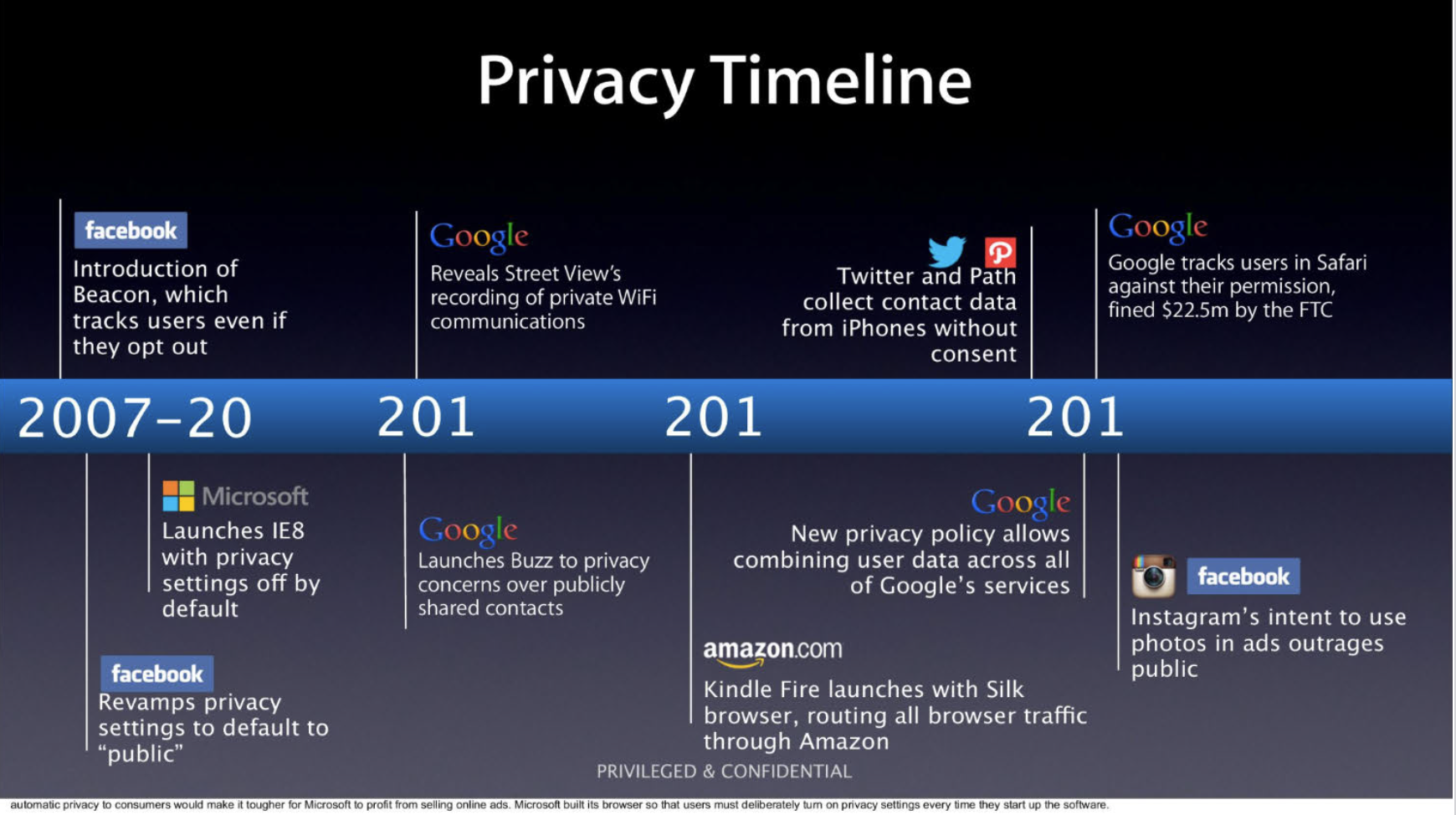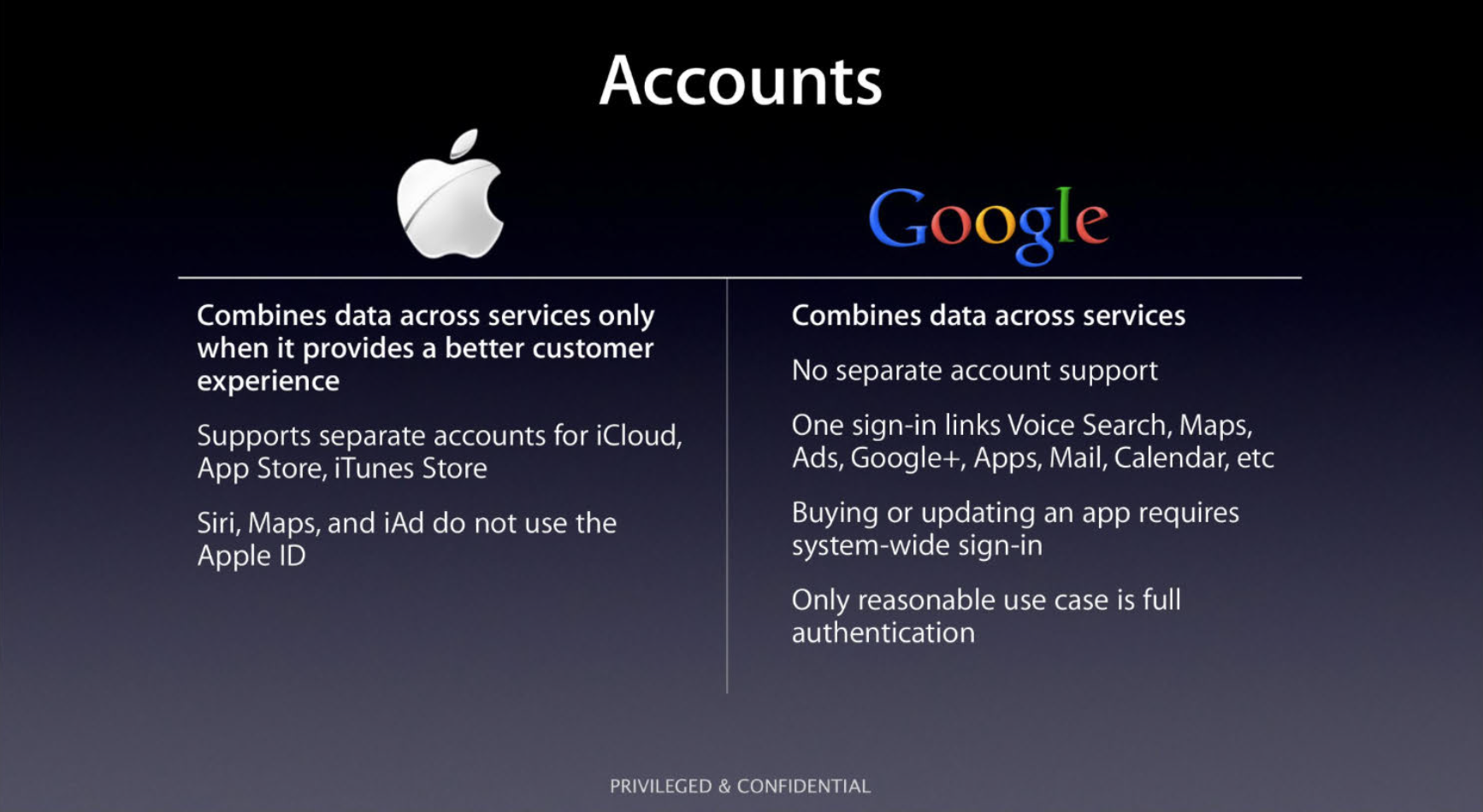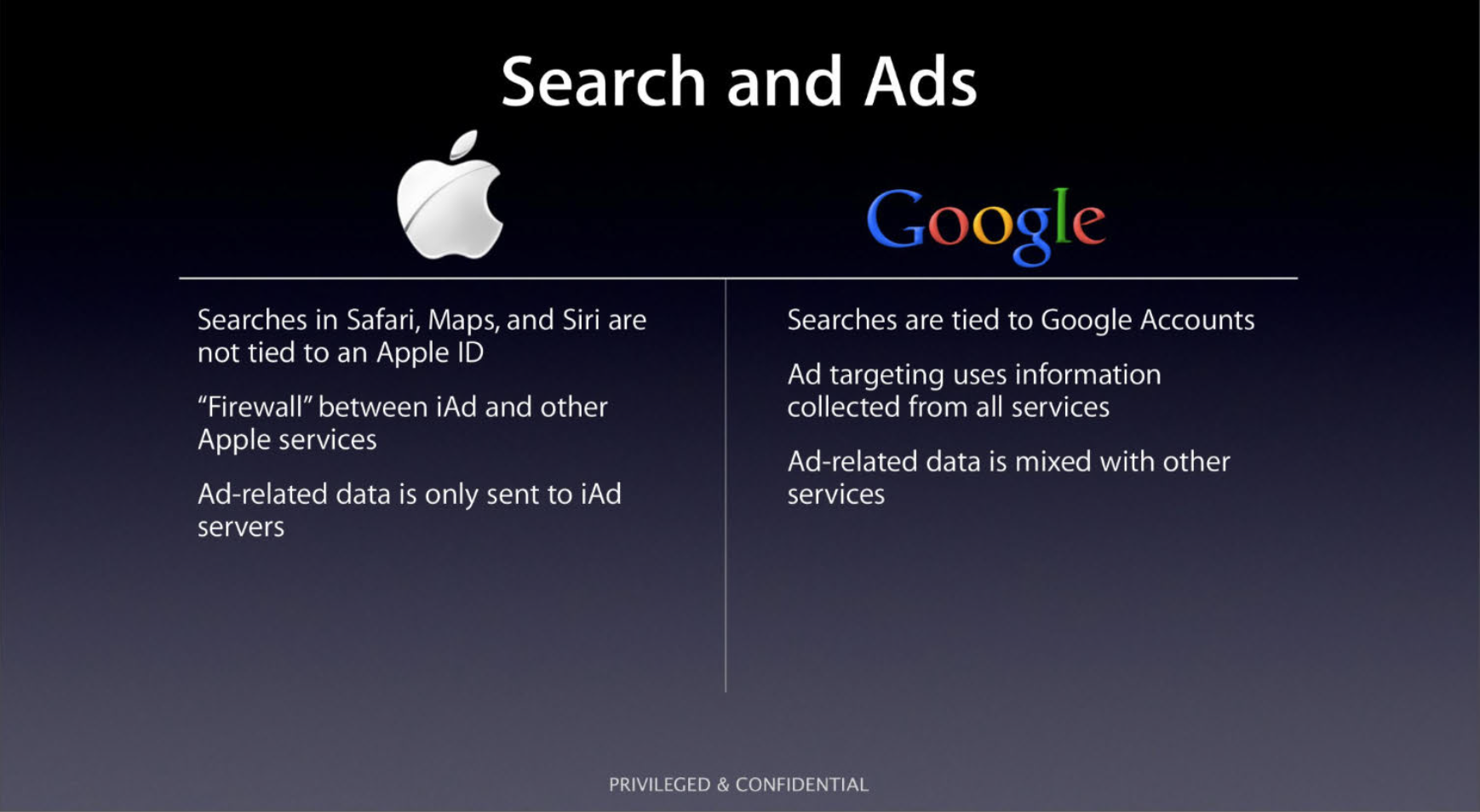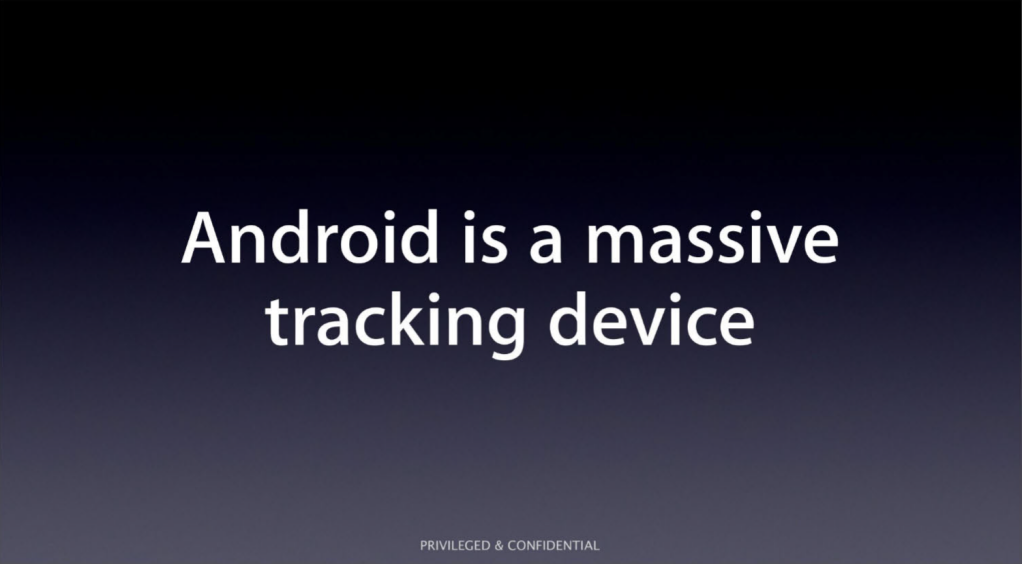Apple and Google have had a complex relationship over the years when it comes to privacy, with Apple often positioning itself as the more privacy-focused company compared to Google’s data collection practices. This rival dynamic emerged clearly in some newly revealed internal Apple documents from 2013 that were made public as part of the ongoing Department of Justice antitrust lawsuit against Google.
The Apple Presentation 2023
 The internal Apple presentation from January 2013 focused on “The State of Privacy” and outlined how Apple believed its approach to privacy stood apart from major competitors like Google, Facebook, Microsoft, and others. One blunt slide simply stated, “Android is a massive tracking device.” While the full context is unknown due to redactions, Apple appeared to be critiquing Google’s practice of combining user data across services tied to Google Accounts and contrasting it with Apple’s support for separate iCloud, App Store, and iTunes accounts.
The internal Apple presentation from January 2013 focused on “The State of Privacy” and outlined how Apple believed its approach to privacy stood apart from major competitors like Google, Facebook, Microsoft, and others. One blunt slide simply stated, “Android is a massive tracking device.” While the full context is unknown due to redactions, Apple appeared to be critiquing Google’s practice of combining user data across services tied to Google Accounts and contrasting it with Apple’s support for separate iCloud, App Store, and iTunes accounts.
On other slides, Apple suggested Google’s voice assistant technology sent transcription data to backend servers that could not be disabled, unlike Apple’s approach with Siri to not associate voice data with Apple IDs. Apple also highlighted that its Maps app did not serve ads or commingle Maps activity with ad data, while Google did.
The presentation ended by emphasizing Apple’s serious commitment to privacy, quoting former CEO Steve Jobs from 2010. However, Apple’s righteous stance on privacy was somewhat undermined by revelations from 2016 Google internal emails that became public through the trial exhibits. These emails suggest Apple wanted data sharing with Google to become more of a “reciprocal” arrangement. Specifically, Apple was interested in obtaining data on which Google search results links were clicked by iOS users. Google made clear it does not share such data, seen internally as key to its search algorithms.
The episode illustrates the ongoing tension between Apple and Google when it comes to privacy practices. While Apple positions its products and services as superior, it is not entirely above seeking user data insights to improve offerings, even if it means obtaining data from Google.
Apple’s Critique of Google Privacy in 2013
The 2013 Apple internal presentation offered a rare window into Apple’s perception of Google’s privacy standards at the time, particularly related to Android. Even back then, Apple seemed eager to cast Google’s practices in a negative light.
 Beyond the “massive tracking device” criticism, Apple called out Google for combining user data across services tied to Google Accounts. This was contrasted with Apple’s support for separate iCloud, App Store, and iTunes accounts on its devices. Apple also suggested Google’s approach of associating searches and ads with Google Accounts enabled extensive monitoring of user activity.
Beyond the “massive tracking device” criticism, Apple called out Google for combining user data across services tied to Google Accounts. This was contrasted with Apple’s support for separate iCloud, App Store, and iTunes accounts on its devices. Apple also suggested Google’s approach of associating searches and ads with Google Accounts enabled extensive monitoring of user activity.
Apple specifically highlighted limitations in Google’s voice assistant technology on Android devices. Samsung’s S Voice reportedly sent transcription data to backend servers that could not be disabled. Apple noted Siri did not connect voice data to Apple IDs in this way.
The presentation also called out Google’s practice of serving ads within its Maps app and allegedly commingling Maps usage data with advertising data. Apple boasted its Maps app contained “no ads” and did not link Maps activity to Apple IDs.
While strongly worded, the presentation lacked concrete details and evidence to fully back up some of Apple’s claims around tracking and data practices. But it revealed Apple staking out a position as a privacy leader compared to Google. Ironically, Apple would face criticism around tracking in later years.
Apple’s Own Data Interests Revealed
Although Apple portrayed Google as having questionable data collection practices in 2013, internal Google emails from 2016 suggest Apple later wanted deeper access to Google user data to improve its products.
 The emails came out through the DOJ trial exhibits. In 2016, Apple asked Google for reciprocal data sharing, so Apple could analyze Google search queries from iOS devices. Specifically, Apple wanted to know which search result links were clicked and how long queries took.
The emails came out through the DOJ trial exhibits. In 2016, Apple asked Google for reciprocal data sharing, so Apple could analyze Google search queries from iOS devices. Specifically, Apple wanted to know which search result links were clicked and how long queries took.
Google employees firmly rejected Apple’s request, making clear that search click data was considered highly confidential and integral to Google’s core search algorithms. The emails exposed some hypocrisy in Apple’s privacy rhetoric, revealing interest in obtaining sensitive Google user data despite presenting itself as highly principled.
However, Apple’s rationale was to analyze aggregate search patterns and clicks to optimize the iOS search experience by relying on Google, rather than enabling tracking of individual users. Nonetheless, it demonstrates both companies aim to leverage user data to improve products, with privacy positions partly serving business interests.
Ongoing Rivalry on Privacy Today
The 2013 presentation and 2016 email exchange encapsulate an ongoing rivalry between Apple and Google on privacy. While Apple strives to differentiate itself through privacy features, Google faces mistrust due to its reliance on data for advertising.
In recent years, Apple has implemented stricter privacy protections in iOS and taken direct shots at Google and Facebook’s tracking practices. Most notably, Apple’s App Tracking Transparency policies introduced in iOS 14.5 require apps to gain explicit user consent for tracking against strong resistance from the advertising industry.
 Google has begrudgingly complied with the requirements, which are estimated to have substantially reduced tracking on iPhones. However, Google’s Android operating system still lacks similar extensive tracking protections today.
Google has begrudgingly complied with the requirements, which are estimated to have substantially reduced tracking on iPhones. However, Google’s Android operating system still lacks similar extensive tracking protections today.
Apple likely sees strong privacy standards as a competitive advantage that builds trust and loyalty among consumers. But Apple still runs a lucrative advertising business based on protecting user anonymity and preventing individual profiling. It must also rely on data collection to continually improve services through personalization and AI advances.
As the companies continue to take different stances on privacy, while competing fiercely in software and hardware, tensions will persist. Both Apple and Google aim to leverage user data to enhance offerings without crossing the “creepy” line, but their visions on where that line lies differ. The rivalry will continue playing out through privacy marketing claims, favored by Apple, and behind-the-scenes data-sharing negotiations reveal more complex motivations.












Comments 3